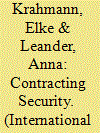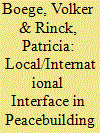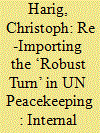|
|
|
Sort Order |
|
|
|
Items / Page
|
|
|
|
|
|
|
| Srl | Item |
| 1 |
ID:
170284


|
|
|
|
|
| Summary/Abstract |
Private military and security companies (PMSCs) are increasingly contracted to provide security in international peacekeeping missions. Yet, we know very little about the practical implications of this development. How do PMSCs reinforce and shape security management within UN peacekeeping operations, and what are the consequences for UN missions and their host populations? To answer these questions, we explore the operational, representative and regulatory security practices in the UN operation in the Democratic Republic of Congo (MONUSCO). Our findings show how seemingly uncontroversial, even benign security practices can have unintended negative consequences. Specifically, we observe that the participation of security firms in MONUSCO's security management contributes to three developments: the differentiation of security between staff and locals, the hardening of MONUSCO's security posture, and the perpetuation of insecurity through the emergence of a local security economy. Contracted security is thus involved in reproducing forms of security that are in some ways diametrically opposed to the aims of the mission to protect civilians and facilitate a sustainable peace.
|
|
|
|
|
|
|
|
|
|
|
|
|
|
|
|
| 2 |
ID:
170285


|
|
|
|
|
| Summary/Abstract |
Existing research suggests that democratization can run counter to building peace in post-conflict contexts. This article analyses the effect of two competing strategies that external actors use to address the conflict of objective between democracy and peace: prioritization and gradualism. The prioritization approach advises sequencing, which means postponing support for democratization and concentrating first on peace in terms of the absence of violent conflict. The gradualist approach promotes peace and democracy simultaneously. This article offers a systematic analysis of these two prominent donor strategies. To this end, it focuses on two critical junctures in two similar post-conflict settings (Burundi and Nepal). Drawing upon extensive field research, the analysis shows that a gradualist approach is not more risk-prone than a prioritization strategy. To the contrary, the analysis suggests that even in most fragile contexts, gradualism can help to foster peace. Prioritization, in turn, may also contribute to the instability it aimed to prevent. Two factors condition the effect of the selected strategy on peace: which dimensions of democracy are affected and to what degree, and whether the institutional context reinforces or counteracts this trend.
|
|
|
|
|
|
|
|
|
|
|
|
|
|
|
|
| 3 |
ID:
170286


|
|
|
|
|
| Summary/Abstract |
In this article, internationally supported peacebuilding is conceptualized as a cross-cultural relational endeavour, with international and local actors engaged in multiple forms of interactions in a local everyday context. Using a cultural-relational approach, two cases of peacebuilding are presented: Bougainville and Sierra Leone, which are at opposite poles of the spectrum of international-local peacebuilding interaction. Peacebuilding on Bougainville has drawn relatively little attention; the international intervention there was modest and small in size, and locals had considerable control of the peace process. By contrast, Sierra Leone is one of the best-known cases of peacebuilding, with massive external engagement and comprehensive external control. Both cases are considered success stories, but they differ considerably due to the differences in local-international relations. This is explained by focusing on two interrelated core aspects of the local-international interface: building relationships and trust, and security provision. Furthermore, another generally underestimated dimension of peacebuilding is explored, namely culturally different understandings of the spiritual realm and their effects on peacebuilding interventions.
|
|
|
|
|
|
|
|
|
|
|
|
|
|
|
|
| 4 |
ID:
170283


|
|
|
|
|
| Summary/Abstract |
Brazil has been the largest troop contributor and provided all force commanders to the UN Stabilisation Mission in Haiti (MINUSTAH, 2004–2017). As the military embraced a leading role in UN peacekeeping’s turn towards peace-enforcement, Brazil’s governments have increasingly relied on soldiers in public security – occasionally even portraying these operations as a sort of ‘peacekeeping at home’. Yet how has Brazil’s participation in MINUSTAH affected internal military operations? I argue that narratives of the military’s effectiveness in Haiti have been used to legitimise the growing scope of internal public security missions. Drawing on data from a questionnaire-based survey, interviews and focus groups with soldiers and officers, this paper argues that the experience in Haiti has fuelled troops’ demands for rules of engagement that resemble those in UN peacekeeping. Given the armed forces’ increasing bargaining power in Brazil’s politics, the military leadership has been able to successfully lobby in favour of changing parts of the legal framework for internal operations. Lessons from the ‘robust turn’ have been used to promote more coercive internal missions of Brazil’s armed forces. Yet it is impossible to fully reconcile the content of the military’s demands with the rule of law in a democracy.
|
|
|
|
|
|
|
|
|
|
|
|
|
|
|
|
|
|
|
|
|